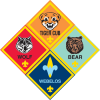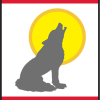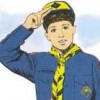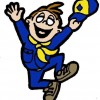 This elective is a chance to learn about what it’s like for people who have trouble doing things that most of us never think about—things like going down the street or watching TV. For a person in a wheelchair or who must use a cane or crutches, just getting around can be difficult. How do they go up the stairs? For a person who has trouble hearing, how do they watch TV or hear the fire alarm?
This elective is a chance to learn about what it’s like for people who have trouble doing things that most of us never think about—things like going down the street or watching TV. For a person in a wheelchair or who must use a cane or crutches, just getting around can be difficult. How do they go up the stairs? For a person who has trouble hearing, how do they watch TV or hear the fire alarm?
This elective will help us all understand our own physical limits as well as what we can do to be sure others can do as much as they are able to do.
Rationale for Adventure
This adventure is intended to help Wolf Scouts learn about physical disabilities, which are more easily and readily understood at their age than are learning disabilities and mental impairments.
Requirements
Complete at least four of the following requirements.
- With other members of your den, try using a wheelchair or crutches, and reflect on the process.
- Learn about a sport that has been adapted so that people in wheelchairs or with some other physical disability can play, and tell your den about it.
- Learn about “invisible” disabilities. Take part in an activity that helps develop an understanding of invisible disabilities.
- With your den, try doing three of the following things while wearing gloves or mittens:
- Tying your shoes.
- Using a fork to pick up food.
- Playing a card game.
- Playing a video game.
- Playing checkers or another board game.
- Blowing bubbles.
- Paint a picture two different ways: Paint it once the way you usually would paint it and then again by using a blindfold. Discuss with your den the ways the process was different.
- Demonstrate a simple sentence or at least four points of the Scout Law using American Sign Language.
- Learn about someone famous who has or had a disability, and share that person’s story with your den.
- Attend an event where people with disabilities are participants or where accommodations for people with disabilities are made a part of the event.
Takeaways for Cub Scouts
- Empathy
- Awareness of disabilities
- A Scout is kind, helpful, friendly, cheerful
Historical Requirements
2015 Handbook Requirements
Wolf Handbook, page 190
Wolf Den Leader Guide, page 111
- With the members of your den, visit with a person who has a physical disability.
- Do four of the following:
- With other members of your den, try using a wheelchair or crutches, and reflect on the process.
- Learn about a sport that has been adapted so that people in wheelchairs or with some other physical disability can play, and tell your den about it.
- Learn about “invisible” disabilities. Take part in an activity that helps develop an understanding of invisible disabilities.
- With your den, try doing three of the following things while wearing gloves or mittens:
- Tying your shoes.
- Using a fork to pick up food.
- Playing a card game.
- Playing a video game.
- Playing checkers or another board game.
- Blowing bubbles.
- Paint a picture two different ways: Paint it once the way you usually would paint it and then again by using a blindfold. Discuss with your den the ways the process was different.
- Demonstrate a simple sentence or at least four points of the Scout Law using American Sign Language.
- Learn about someone famous who has or had a disability, and share that person’s story with your den.
- Attend an event where people with disabilities are participants or where accommodations for people with disabilities are made a part of the event.






